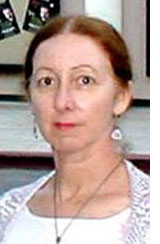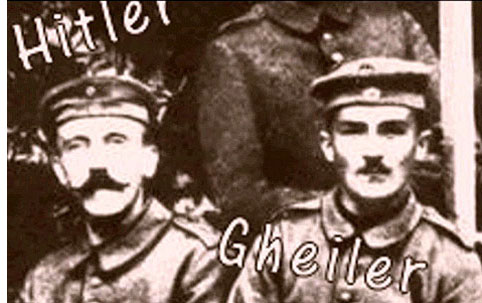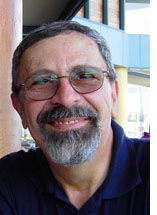| |
|

Scholar-in-residence
● Rabbi Ari
Kahn, director, Foreign Student Programs,
Bar Ilan University, Israel, Feb.
22-23
Presentations are free; kosher meals moderately priced
Call us for details at (619)
287-9890, Please reserve Shabbaton meals




REFLECTIONS
Happy Birthday, Mr. President - Your day should be more than a day off from work
By Sheila Orysiek
 SAN DIEGO—Take an old quarter from your pocket, and you will not find a name on it, yet we all know whose profile it is. We look at his image from across the space of two centuries and he seems only two dimensional, yet to most of the people who knew him he was the most impressive person they had ever met. From punctilious New Englanders such as John Adams to the mud-soaked foot soldiers he commanded, he was considered a natural leader. He had an instinctive knowledge of people and how to motivate them. The longer people knew him the more they revered him. SAN DIEGO—Take an old quarter from your pocket, and you will not find a name on it, yet we all know whose profile it is. We look at his image from across the space of two centuries and he seems only two dimensional, yet to most of the people who knew him he was the most impressive person they had ever met. From punctilious New Englanders such as John Adams to the mud-soaked foot soldiers he commanded, he was considered a natural leader. He had an instinctive knowledge of people and how to motivate them. The longer people knew him the more they revered him.
His natural dignity was sometimes seen as aloofness, yet he was renowned for his modesty. He would have no part in putting himself forward. When his name was mentioned for public office he would immediately leave the room. He was not considered as well educated as others in his socio-economic class, but others more solidly educated paid great attention to his words. We celebrate February 22nd as his birthday but he was not born on that day as the country was on a different calendar at the time.
Though he was born into a slave-dependent economy he attempted to ameliorate the condition of his slaves. He would not allow slave families to be sold even though it was against his own best financial interests. He was the only one of the Founding Fathers who made provision for his slaves and then wrote his will to set them free upon Martha’s death. However, they were freed before she died and it left his estate bankrupt.
He was the epitome of a loyal friend and a loyal British subject, yet became a revolutionary. As a colonel in the King’s army his military tactics were admired, yet he inadvertently helped start a war between France and England in the wild interior of America in what is known here as the French and Indian War (the Seven Years War in Europe). He made himself conspicuous in battle, sitting astride a tall horse so that his soldiers would see him and be heartened. His clothes often had bullet holes in them, yet he was never struck. His men believed that G-D truly protected him.
He was unanimously given command of the rag tag army at Bunker (Breed’s) Hill which he accepted knowing full well he would be hung as a traitor if he was captured. He is shown in sculptures and paintings on a white stallion, yet his favorite horse was a beautiful brown stallion named Magnolia. He was a victorious general, but became most adept at retreating. He refused to fortify his own home, Mt. Vernon, from the British Army saying his home should be as much at risk as any other. He was not considered a noteworthy writer or speaker, yet the words of his Farewell Address as he departed the presidency are a hallmark in our nation’s history and when he said goodbye to his officers, he brought them to tears. He yearned for the peace of his home, but spent most of his life away.
He was the one man whom all the other Founding Fathers found impressive and the only one around whom they could coalesce. He was the consummate southern gentleman, yet was the only one the north could trust as a general and as a president. Offered a crown, he chose to go home after commanding his country’s armies. He is the only president in our history to receive one hundred percent of the electoral votes. He refused power repeatedly, and so it was given to him again and again. He set the standard of how a president should be treated and chose to be called “Mr. President” rather than “Your Excellency” or other suggested titles.
He presided at the birth of a democracy (representative republic), yet insisted on the privilege of a chief executive. He was asked to stay as president for a third term, however, he felt it was important to set the precedent of only two terms. His cabinet officers were united in their love and respect for him, yet were also the most divisive in our history, eventually founding two different political parties. He never lived in the White House or in the city that is named for him.
He agreed to the restructuring of the nation’s debt after the Revolution even though he knew it would bankrupt him. He honorably paid his debts twice over to merchants far away in England when the U.S. currency was devalued. He was physically graceful and elegant. However, it was his innate honesty that captured everyone who came in contact with him. He was never known to break his word. He believed in honor and he was a religious man. In later years he wished only to be let alone, yet courteously welcomed the hundreds who flocked uninvited to his home.
He was admired as a man’s man and enjoyed hearty male company and yet he loved to dance with the ladies and the ladies adored him. He comes down to us as a dour man, but he loved a good party. Though his mother was an embarrassment to him he was a loving son. He raised his stepchildren with love and care as a true father would.
 There are few portraits of him, yet we each carry one in our wallets. He expressly forbade any monuments to be built in his memory; however, the largest monument in our country bears his name. He wanted very much to live to see the turning of the century but died only a few days before 1800. He never had any children and yet he is known as the father of our country. He knew that times and policies can change and therefore believed above all things that character counts. Few people are considered to be truly indispensable, yet in the three areas in which he served, as general, as presiding officer of the Constitutional Convention, and as our first president, everyone agreed he was the only one who could fill the offices. There are few portraits of him, yet we each carry one in our wallets. He expressly forbade any monuments to be built in his memory; however, the largest monument in our country bears his name. He wanted very much to live to see the turning of the century but died only a few days before 1800. He never had any children and yet he is known as the father of our country. He knew that times and policies can change and therefore believed above all things that character counts. Few people are considered to be truly indispensable, yet in the three areas in which he served, as general, as presiding officer of the Constitutional Convention, and as our first president, everyone agreed he was the only one who could fill the offices.
Though George Washington could not have met many Jews during his life, with great care he answered a letter of congratulations from the Jewish community. On August 17, 1790, Moses Seixas, from the Congregation Kahal Kadosh Yeshuat Israel (Touro Synagogue), of Newport, Rhode Island, wrote a letter to welcome the first President of the United States when he visited that city. At that time approximately three hundred Jews lived there.
In the letter that Seixas’s wrote on behalf of the Congregation, using the phrase “the children of the Stock of Abraham,” he expressed the community’s welcome and esteem for the new president. It told of the community’s pleasure that the G-D of Israel had protected him as He had protected King David and that as Jewish citizens they considered themselves part of the great experiment in self-government.
Seixas’s words have become part of our American heritage when he said: “A Government which to bigotry gives no sanction, to persecution no assistance—but generously affording to All liberty of conscience, and immunities of citizenship: - deeming every one, of whatever nation, tongue or language equal parts of the great Governmental Machine: – This so ample and extensive federal union whose basis is Philanthropy, mutual confidence, and public virtue, we cannot but acknowledge to be the work of the Great G-D, who ruleth the Armies of Heaven, and among the Inhabitants of the Earth, doing whatsoever seemeth [to Him] good.”
The letter closed by asking G-D to send an “Angel who conducted our forefathers through the wilderness into the promised land [to] conduct [Washington] through all the difficulties and dangers of this mortal life.”
Seixas added the hope that “When like Joshua full of days, and full of honor, you are gathered to your Fathers, may you be admitted into the Heavenly Paradise to partake of the water of life, and the tree of immortality.”
Washington replied thanking the Jewish congregation for the letter and in closing with consummate courtesy echoed back Seixas’s own words:
“The Citizens of the United States of America have a right to applaud themselves for giving to Mankind examples of an enlarged and liberal policy: a policy worthy of imitation. All possess alike liberty of conscience and immunities of citizenship. It is now no more that toleration is spoken of, as if it was by the indulgence of one class of people that another enjoyed the exercise of their inherent natural rights. For happily the Government of the United States, which gives to bigotry no sanction, to persecution no assistance, requires only that they who live under its protection, should demean themselves as good citizens.
May the Children of the Stock of Abraham, who dwell in this land, continue to merit and enjoy the good will of the other Inhabitants; while every one shall sit under his own vine and fig tree, and there shall be none to make him afraid.
Washington closed with an invocation:
“May the father of all mercies scatter light and not darkness in our paths, and make us all in our several vocations useful here, and in his own due time and way everlastingly happy.”
Happy Birthday, Mr. President George Washington.
Source of letters quoted: American Jewish Historical Society.
Orysiek is a freelance writer and dance critic based in San Diego



THE JEWISH CITIZEN
That annoying guy in the German trench
By Donald H. Harrison
 SAN DIEGO—One of the stranger films shown at the recently completed 18th Annual San Diego Jewish Film Festival was Diary of Niclas Gheiler, a documentary by George Augilar, his grandson. SAN DIEGO—One of the stranger films shown at the recently completed 18th Annual San Diego Jewish Film Festival was Diary of Niclas Gheiler, a documentary by George Augilar, his grandson.
Gheiler fought for Germany in World War I and spoke aloud about the futility and wastefulness of war. Many members of his unit agreed with him, for it is the kind of things that soldiers think and say, especially when they are cowering in a tranch during a bombardment. But one of the members of Gheiler's unit took exception to the sentiments of Gheiler, a Jew. He denounced him as a coward!
Gheiler didn't take the man seriously, and he scoffed, when following a bombardment, the man wanted to charge out of the trenches and fight a glorious battle for the Kaiser. Gheiler told the man that the only thing worse than the bombing was his constant raving. The man shot him a look of pure hatred, and soon thereafter he volunteered to carry messages between headquarters and the front lines.
 All of this might be a minor personality clash in a war, except for one thing. Gheiler was a Jew. And his antagonist's name was... Adolf Hitler. All of this might be a minor personality clash in a war, except for one thing. Gheiler was a Jew. And his antagonist's name was... Adolf Hitler.
On another occasion, Gheiler saw Hitler painting a gloomy scene. Leaning over the would-be artist's shoulder, he asked why he didn't paint something livelier. Hitler thundered back that he wouldn't paint anything at all for a traitor like him.
After the war, another veteran of their unit joined the Nazi party, not because he believed in its ideology, nor because he thought of Hitler as anything but a fool. He joined because he believed that as a Nazi he could gain advancement and privilege in the society seething over its humiliation by the Allies at the end of World War I. The man, knowing that Gheiler was a Jew, took him under his protection, and persuaded him to emigrate to Peru, where the friend had a job waiting in Nazi Germany's diplomatic corps.
Gheiler went with him, but left his Aryan wife and their daughter behind. After a year the wife stopped writing to him; he later learned that their daughter, who took after her in looks, ironically was being used as a poster child for pure Aryan blood. Imagine how angry the Nazis would have been if they learnedthey had been duped. Both his wife and his daughter might have been murdered right on the spot.
So Gheiler took a mistress in Peru, who conceived a daughter. A generation later, his little girl would marry and their child would grow up to be a film producer, curious about the life of his Jewish grandfather. Stitching together home movies and newsreels, director Aguilar did away with spoken dialogue. Subtitles, following the flow of words in Gheiler's diary, were typed across the bottom of the screen. Music and occasional sound effects broke the silence.
Gheiler might have lived the remainder of his days in Peru with his new family, were it not for the fact that his parents had died, and his sister Anna was now alone and very much afraid of what was happening in Hitler's Germany. Gheiler decided to go back to Europe to get her.
In fairness, what happens to Gheiler after he returns to Germany ought not be told, so as to preserve the suspense of the story.
But watching the short documentary, I found myself very impressed by how well Aguilar had meshed footage drawn from here and there to match his grandfather's written words. Diary of Niclas Gheiler is a strange movie. But it was quite compelling.



Entertainer of Nazis still keeps warbling
By Peter Garas
 CANBERRA, Australia—I was fascinated to read about the return to the stage of a 104 year old Dutch cabaret singer who is alleged to have performed for the Nazis including Adolf Hitler and visited Dachau. CANBERRA, Australia—I was fascinated to read about the return to the stage of a 104 year old Dutch cabaret singer who is alleged to have performed for the Nazis including Adolf Hitler and visited Dachau.
Simple morbid curiosity requires me to ask what this man can possibly offer to an audience these days?
I take it that a rendition of "Shake Rattle and Roll" was not on the program!
He must have something!
Apparently Johannes Heesters, born Johan, began his career in Amsterdam in the 1920s and moved to Germany in 1935, where he enjoyed a successful career.
These days I wonder if the curiosity is to see someone of this age manage to perform at all.
Interestingly the Allies apparently allowed him to keep performing after the war in-spite of allegations like:
"He kept singing for the Nazi regime, for the Wehrmacht, and he earned millions," said Piet Schouten, representative of a committee formed to protest against Saturday's performance.
"We have a problem with that on behalf of all the victims," he told national broadcaster NOS.
The world is a strange place and filled with even stranger stories!
 . .
SAN DIEGO JEWISH WORLD THE WEEK IN REVIEW
Peter Garas in Canberra, Australia: Arab media censorship plan may indicate various governments are feeling shaky
Donald H. Harrison in San Diego: House of Israel members describe plans
for better reflecting modern-day Israel
Rabbi Baruch Lederman in San Diego: The case of the Holocaust victim's tefillin
Rabbi Leonard Rosenthal in San Diego: What rabbis hear when in Washington
Ira Sharkansky in Jerusalem: U.N., Hamas are blaming Israel for
Palestinians' self-inflicted problems
Friday-Saturday, Feb. 15-16, 2008 (Vol 2., No. 40)
Cynthia Citron in Los Angeles: Joan Rivers' describes her play, and for that matter herself, 'a work in progress.'
Peter Garas in Canberra, Australia: Treasure of our ancestors' remembrances
Donald H. Harrison in San Diego: Son of Israel's president salutes SDSU's Middle East trust-building program
Dov Burt Levy in Salem, Massachusetts: We Jews should 'accentuate the positive'
Marissa Palin in San Diego: The Morning After: What should be done with all those Valentine greeting cards?
Ira Sharkansky in Jerusalem: Is terrorist's assassination worth price?
Judy Lash Balint in Jerusalem: Terrorist feels victims' pain in last moment
Shoshana Bryen in Washington, D.C.:The avenger, the minion and the protector
Donald H. Harrison in San Diego: Youth, not a time of life; a state of mind
Sheila Orysiek in San Diego: It was no ordinary walk
Rabbi Michael Berk in La Jolla, California: What kind of plague is darkness?
Carol Davis in Coronado, California: This 'Dolly' is bound to improve with age
Peter Garas in Canberra, Australia: Writer has 'out of this world' name
Donald H. Harrison in San Diego: Aviva, what part of you would you sell?
Congressman Bob Filner in Washington, D.C.: The nation mourns death of Congressman Tom Lantos, a champion of human rights
Donald H. Harrison in San Diego: A Love to Hide refers to two relationships
J. Zel Lurie in Delray Beach, Florida: Hillary Clinton will be our next President
Ira Sharkansky in Jerusalem: Most Israelis favor strong retaliation against Gaza for rocket attacks
< BACK TO TOP
|
|
